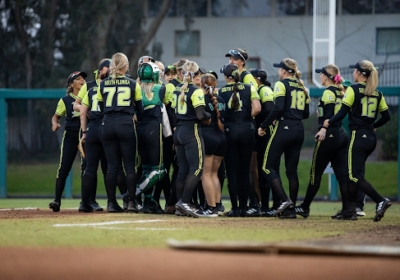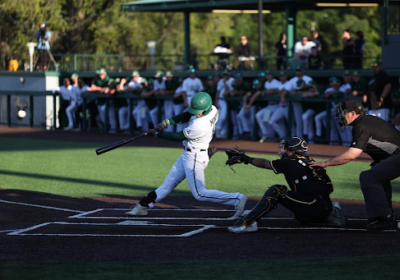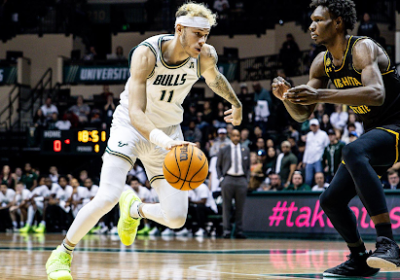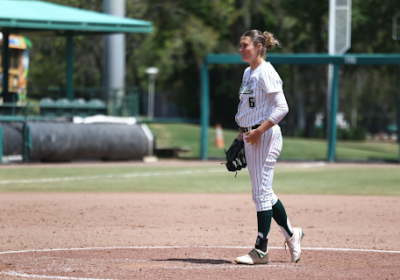Checking in with USF’s athletic director after his first year
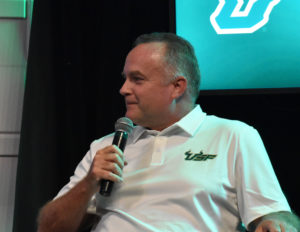
In a little over a year, Michael Kelly has left his mark on USF Athletics. ORACLE PHOTO/BRIAN HATTAB
Earlier this month, Michael Kelly celebrated a milestone.
Aug. 6 officially marked his one-year anniversary as USF vice president of athletics — and Kelly was nowhere to be found in the Lee Roy Selmon Athletics Center.
That’s because he was in Quebec with the men’s basketball team on its Canadian tour. Kelly didn’t let the anniversary go by without marking the occasion, tweeting a video thanking Bulls fans for their support throughout his first year on the job.
And what a year it’s been. Since Kelly has taken over, USF Athletics has seen record donations, revived fan-engaging events and bumped the Gators from the dominant sports radio station in Tampa Bay — all while its athletic director was learning names and faces.
The Oracle had the opportunity to sit down with the head of USF Athletics recently to talk about his first year on the job, the department’s scheduling philosophy and becoming a force in the Tampa Bay area.
A record year
When USF Athletics was in search of a new leader during the summer of 2018, by the search committee’s own admission, it needed someone who could raise funds. The department at the time was exploring both an on-campus stadium and an indoor practice facility for its football team, but hadn’t made much progress toward either.
Fast forward to the present, and USF has focused its wishlist solely on the indoor practice facility, which would be part of a larger football complex that would house offices, weight rooms and other football operations that presently reside in the Selmon Center.
That focus has paid off. Since Kelly has been in charge, USF has raised $14 million toward the football center, the largest amount the department has raised in a year.
But there’s still a long way to go. The $20 million total that has been raised is only half the original estimated cost of the facility, and as USF football practices continue to be affected by the unpredictable Florida weather, it’s easy to want it all now.
“Our fans want it now, our coaches want it now, Michael Kelly wants it now,” Kelly said. “But then you have to take a step back and say, not to make excuses, but we are a relatively young university, there’s only so many donors that have the capacity to do certain things. And it takes time to cultivate that.
“We’re making strides that are frankly unprecedented, and you’ve got to take pride in that, but then use that as an impetus to keep on going.”
There’s no set dollar amount or date for groundbreaking, according to Kelly. In an ideal situation, the department would have most of, if not all, the funds raised and build the entire facility at once. While Kelly wouldn’t rule out ever considering building it in stages if it became necessary, it may be tough to do from a logistical standpoint.
“If there ever becomes a reason to look at it, we will,” Kelly said, “but I keep trying to stress it — the facilities, they’re so intermingled that the indoor center is connected to the football center, it blends into the weight room itself. So it’s meant to be a symbiotic building. So that’s why it’s hard to do it in phases. I guess if we get to a point where we’ll evaluate what we have to do for the betterment of the program, but it’s completely our intent, and I’ve only looked at it, as a one-project building.”
Regardless of when and how it’s built, when the football center gets fully funded, donations, both big and small — including a fan-run website which is tracking pledges proportional to how the football team does in 2019 (touchdowns, wins — even made extra points) — will have been a huge factor in the process.
But it takes an engaged community to raise that kind of money. In the past year, a number of community events in the Tampa Bay area have either debuted or been revived after being dormant, such as BullsFest, which benefited the Selmon Mentoring Institute, and the newly announced Horns Up Rallies, which will take place the night before home football games in various locations around the Tampa Bay area.
“No longer do I think that anyone could ever say that we’re not making the effort to be increasingly relevant, to be increasingly present and engaged throughout the Tampa Bay community,” Kelly said. “It’s just a step in the right direction and we’ll continue to grow it as we go forward.”
A new home
Relevancy in Tampa Bay is something Kelly alluded to in his introductory press conference in June 2018, telling the community that, no matter where they actually went to school, USF is Tampa Bay’s hometown college team.
But it’s no secret the number of Gators and Seminoles that reside in Tampa. Even the relatively green-and-gold Temple Terrace sees splashes of orange and blue on license plates from time to time.
But Kelly and USF took a large step toward becoming the hometown collegiate team this summer after signing a three-year deal with iHeartMedia to air USF football games on legacy sports-talker WDAE-AM 620, which also has FM translators at 95.3 FM in Tampa and 96.7 FM in Pasco County. Prior to affiliating with USF, WDAE had been the Tampa Bay affiliate of the Gators since around the turn of the century.
“I think it just shows kind of the momentum we’ve got going on around here that we were able to garner that kind of attention,” Kelly said, “and to be on the strongest sports-talk radio here in Tampa — that’s got an AM and an FM component — is huge. Not just for the listening of the game itself, which is great, but the promotion opportunities — we had a relationship, but now to be the home of the Bulls gives us a lot more presence on there with our coaches with personalities and the ability to promote.”
Part of the deal also includes a second Bulls Unlimited streaming station on the iHeartRadio app, which will be the radio home for all non-football broadcasts. Launched in 2017, Bulls Unlimited made USF one of only a few collegiate departments with its own dedicated radio stream.
“You can hear that loud and clear worldwide,” Kelly said. “And I’m proud of being a leader in that area, and having that kind of 24/7 audio station for us is big.”
A Powerful schedule
If there’s anybody who knows what the College Football Playoff (CFP) committee is looking for when it comes to strength of schedule, it’s the former COO of the CFP. By Kelly’s own admission, until the 2018 season, he had been in every single committee meeting since the CFP’s inception.
USF football made national waves after scheduling a two-for-one series with Alabama earlier this summer, adding onto a future nonconference schedule that includes Florida, Miami and Texas.
But it’s not just football that’s packed a Power Five punch into its non-AAC slate. Women’s basketball will play two of the four Women’s Final Four teams — including an away game against national champion Baylor — during nonconference play alone, men’s soccer will open its season on the road against national champion Maryland and women’s soccer has already played Auburn and Florida to open up its regular season.
“We are aggressive in our nonconference scheduling,” Kelly said. “It helps us get into NCAA postseason play if we don’t win the conference and get the automatic bid. It’s something that our players — if you’re going to play the game, you want to play amongst the best and prove yourself to be the best. So they like to play it. And it’s good for our fans. They obviously want to see teams against opponents that they consider amongst the nation’s best as well.
“It’s fun for us to measure ourselves against the best. And the great thing is we’ve been showing quite well.”
Representation unlike any other
A year into his second tenure at USF — he served as an associate athletic director in the early 2000s — Kelly is no longer the newest executive on campus.
Following the retirement of Judy Genshaft on July 1, Steven Currall was appointed USF’s seventh president.
While Currall is going through the same “drinking water out of a firehose” stage of learning everybody’s name that Kelly went through last year, he’s still making time to listen to USF Athletics.
“He’s very open minded, he wants to be very well educated on athletic matters and issues,” Kelly said. “We’ve been able to see him every week at his leadership council meetings, which I appreciate, and we have kind of regular scheduled 1-on-1 meetings. He’s asked great questions, he’s very knowledgeable. He was a high school athlete, likes sports. So that’s a great step in the right direction.
“I can tell he’s very, very receptive and very interested in helping us reach our goal.”
The communication between Kelly and university leadership didn’t start with Currall’s appointment though. Unlike previous athletic directors, Genshaft had Kelly on her executive team — as does Currall presently.
“I think it’s essential that all athletic directors be represented at that level,” Kelly said. “It’s an important part of the university. I appreciate being recognized as such, because there’s things that are important to the rest of the university that we should know to be able to explain. And I think there’s needs and opportunities that we present and provide that the university should know about as well.”
Genshaft even brought Kelly to Tallahassee earlier this year as part of USF Day at the Capitol, marking USF Athletics’ first representation on such a trip.
“It was great for me to go up there and be a part of the team, and it’s great to meet our different legislators and kind of see what happens,” Kelly said. “There’s not a lot of direct dialogue that can necessarily ever be used on athletics, and I understand it. But that doesn’t mean we don’t build an overall relationship.
“It’s engagement. And that kind of helps spread the Bulls’ brand across the state. And that’s a good thing for us.”


